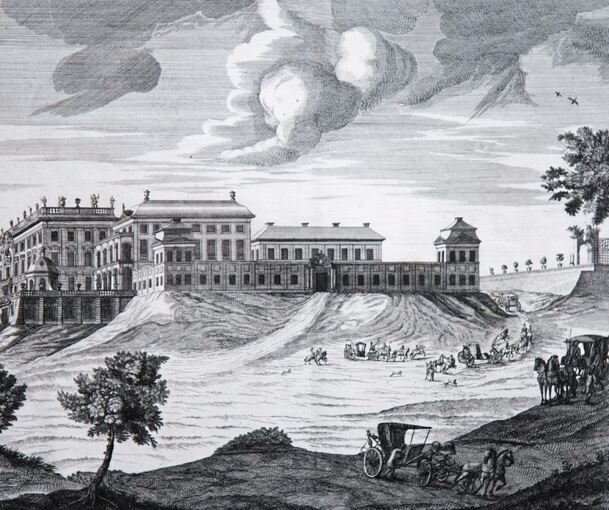https://t.co/LXMj1pRHP8:
"The epitaph of the United States may be that the idea of the rugged individualist was a lie, there never were any, and in the age of air travel and medicine we’re all very connected, our well-being depends on other people’s well-being."
"By the division of labor men have become interdependent, so that every man works for some other man... But during all my life I have worked for other men, and thus I am every man’s servant;"
More from News
You want to know about Barockschloss Ludwigsburg? Too bad, I'm going to tell you some stuff about it, as it's my 'local'...
It all came about because Eberhard Ludwig, Duke of Württe.berg, decided in 1704 that he wanted a big old palace from which to be an absolutist Duke, and do absolutist things. So, picking an old hunting lodge, he started to extend it...

Thing is, though, to build a residential palace, you need a workforce. To gain a workforce, they needed somewhere to live. So, alongside the palace, he founded the town of Ludwigsburg, now adjacent to Stuttgart.

Ludwig resided at Ludwigsburg until 1733, when, childless, he kicked the bucket. Then Carl-Eugen, a relative, became Duke, and that's when things became lit.

See Carl Eugen had been raised in the court of Frederick the Great, and had been deprived of fun and female company - they were banned from the Prussian court.
So, he was essentially a big fat party animal from the get-go.

Ludwigsburg Residential Palace is often nicknamed the \u2018Versailles of Swabia\u2019! Take with our #DailyDrone a bird\u2019s-eye view of one of the largest Baroque palaces in Germany. pic.twitter.com/9nn8oY34HG
— DW Culture (@dw_culture) December 21, 2020
It all came about because Eberhard Ludwig, Duke of Württe.berg, decided in 1704 that he wanted a big old palace from which to be an absolutist Duke, and do absolutist things. So, picking an old hunting lodge, he started to extend it...

Thing is, though, to build a residential palace, you need a workforce. To gain a workforce, they needed somewhere to live. So, alongside the palace, he founded the town of Ludwigsburg, now adjacent to Stuttgart.

Ludwig resided at Ludwigsburg until 1733, when, childless, he kicked the bucket. Then Carl-Eugen, a relative, became Duke, and that's when things became lit.

See Carl Eugen had been raised in the court of Frederick the Great, and had been deprived of fun and female company - they were banned from the Prussian court.
So, he was essentially a big fat party animal from the get-go.

1/1 On @seanhannity last night (at 5:56 of this clip), @SenTedCruz said that the Hayes-Tilden Commission was "charged with reviewing the evidence and making a determination about the disputed ballots." That's incorrect. The Commission was tasked with determining which rival ...
2/2 ... group of electors was appointed by the authority within state government entitled to make that appointment at the time the electors cast their votes on the constitutionally required day. Justice Joseph Bradley, who was held the intentionally tiebreaking seat on the ...
3/3 ... 15-member Commission, explained his decision in favor of Hayes by saying that it was NOT the Commission's authority (NOR Congress's, from which the Commission derived its subsidiary power) to determine whether the state properly counted its popular vote. Instead, ...
4/4 ...it was the Commission's job to figure out which of the competing claims was correct concerning who had authority under state law to make the determination upon which the appointment of electors would be based. For Florida, Bradley ruled that the state's canvassing board...
5/5... had this authority at the time the electors voted & thus Congress was obligated to accept the votes cast by the electors that the canvassing board had appointed, and this was true even if the canvassing board's appointment was based on a mistake or even fraud affecting ...
Tomorrow is an important day. We have an obligation to protect the integrity of the election & our democratic system. That\u2019s why 10 of my colleagues & I are calling for an Electoral Commission to conduct an emergency 10-day audit to examine voter fraud allegations. pic.twitter.com/fExTpxlmKl
— Senator Ted Cruz (@SenTedCruz) January 6, 2021
2/2 ... group of electors was appointed by the authority within state government entitled to make that appointment at the time the electors cast their votes on the constitutionally required day. Justice Joseph Bradley, who was held the intentionally tiebreaking seat on the ...
3/3 ... 15-member Commission, explained his decision in favor of Hayes by saying that it was NOT the Commission's authority (NOR Congress's, from which the Commission derived its subsidiary power) to determine whether the state properly counted its popular vote. Instead, ...
4/4 ...it was the Commission's job to figure out which of the competing claims was correct concerning who had authority under state law to make the determination upon which the appointment of electors would be based. For Florida, Bradley ruled that the state's canvassing board...
5/5... had this authority at the time the electors voted & thus Congress was obligated to accept the votes cast by the electors that the canvassing board had appointed, and this was true even if the canvassing board's appointment was based on a mistake or even fraud affecting ...






























